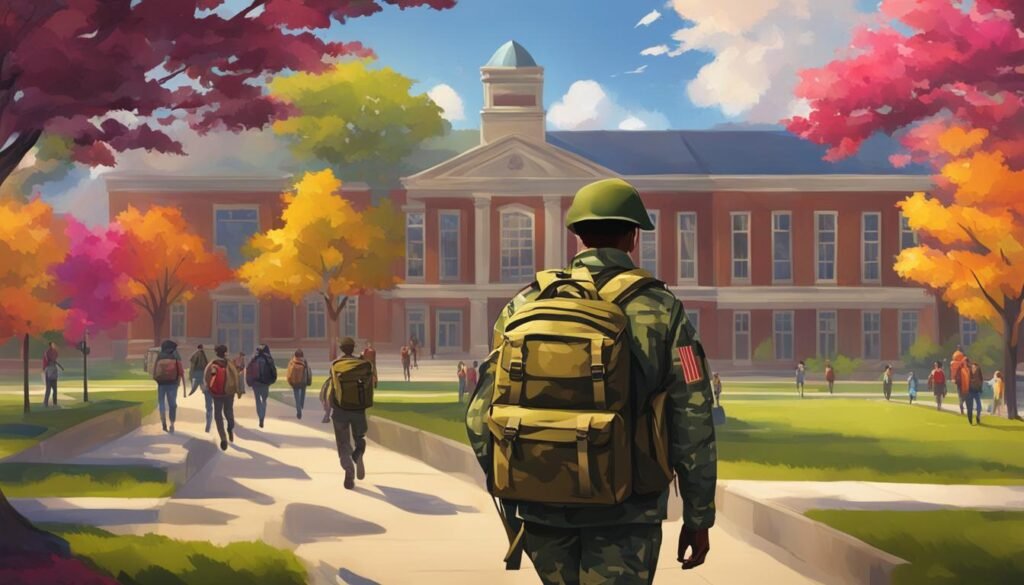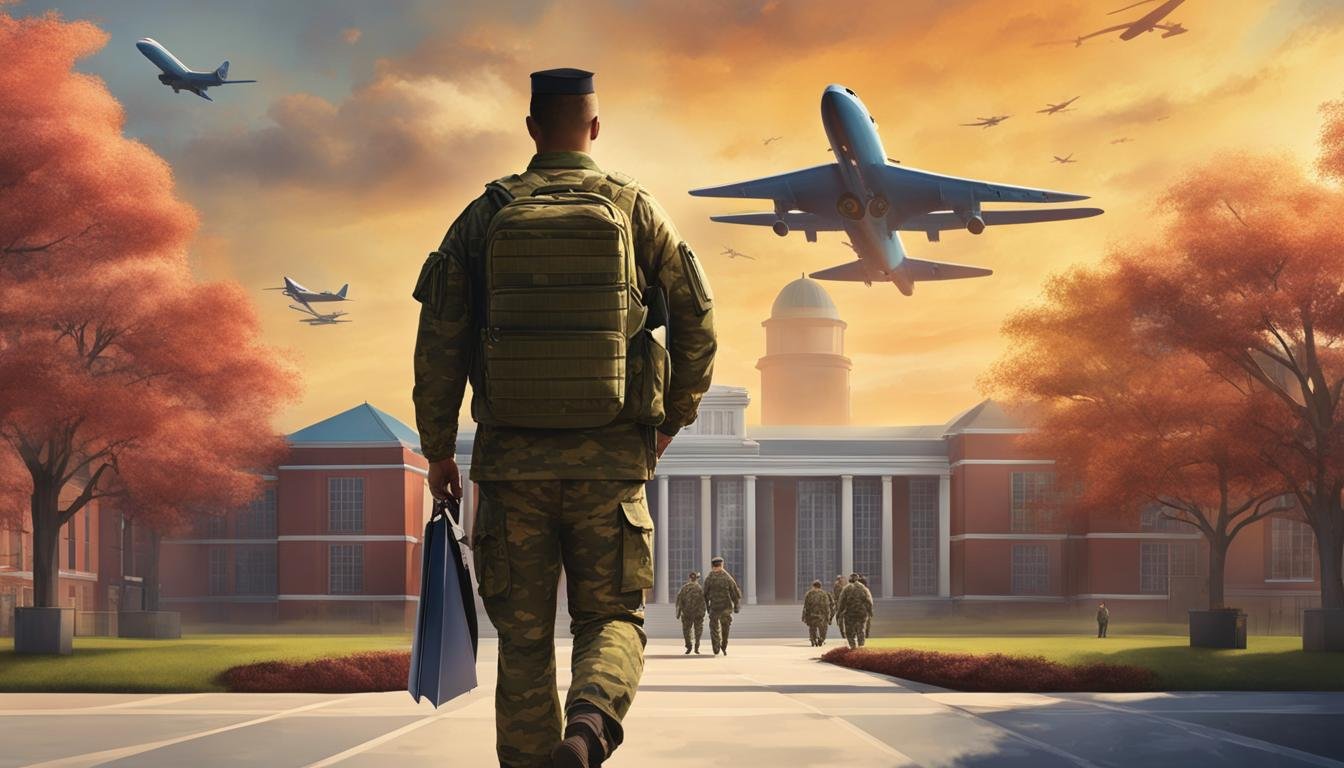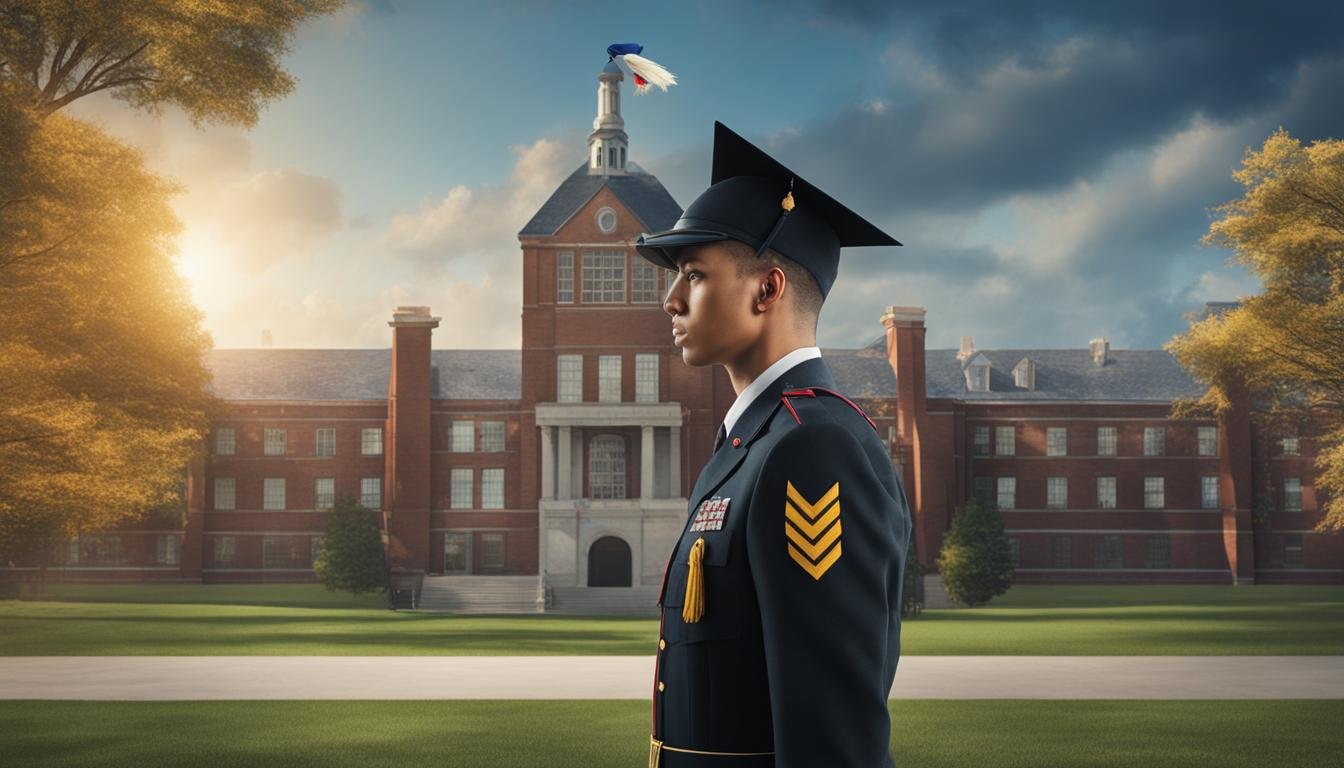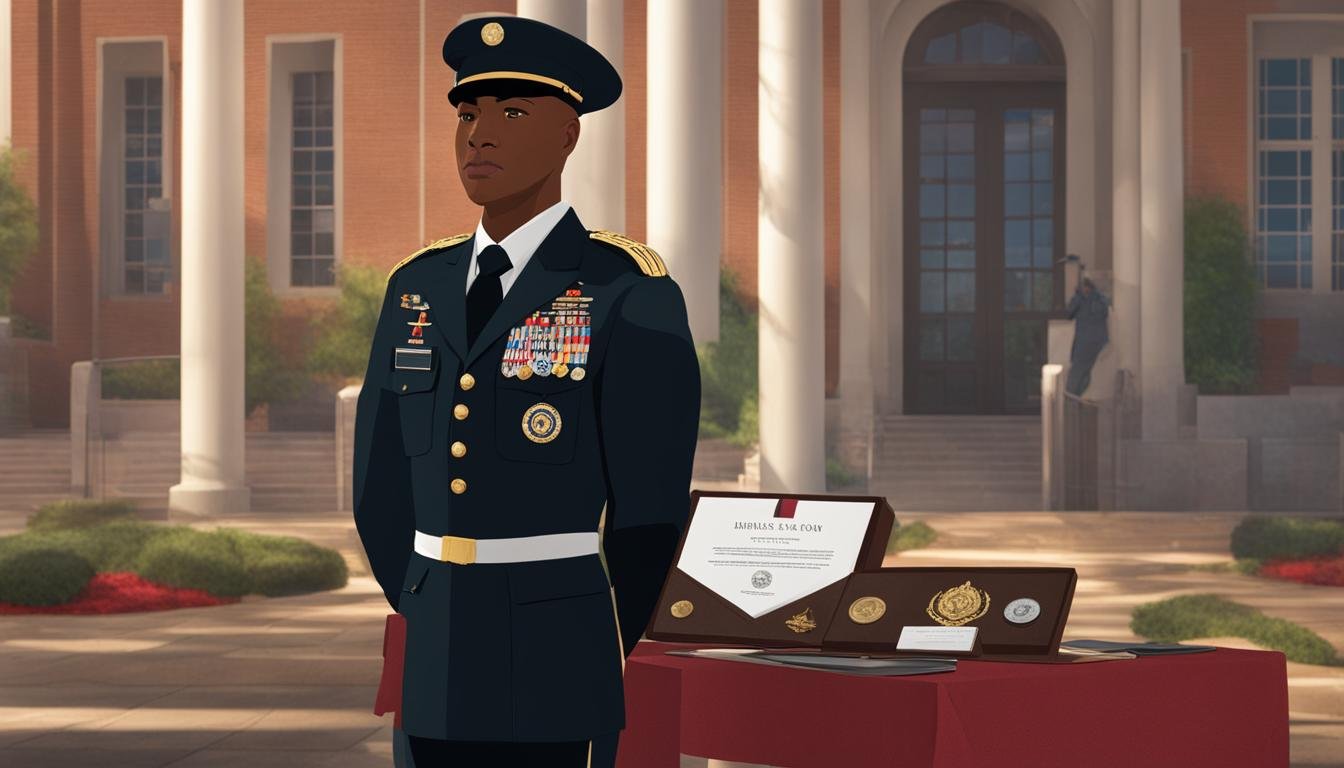Transitioning from military life to college can be challenging, but with the help of resources and support systems, veterans can successfully navigate this transition. The expanded opportunities created by the Post-9/11 GI Bill® and the Forever GI Bill® have made college educations more accessible to over 1.7 million military veterans. Colleges, veteran’s groups, and student-run organizations provide academic counseling, financial aid, and mental health resources to support veterans during this transition. It is important for veterans to determine their eligibility for benefits under the GI Bill® and to choose a school that aligns with their needs and interests.
Key Takeaways:
- Military veterans can utilize resources and support systems to navigate the transition from military life to college.
- The Post-9/11 GI Bill® and the Forever GI Bill® provide expanded opportunities for veterans to access college educations.
- Colleges, veteran’s groups, and student-run organizations offer academic counseling, financial aid, and mental health resources for transitioning veterans.
- It is crucial for veterans to determine their eligibility for benefits under the GI Bill® and choose a school that meets their needs.
- By utilizing available resources and support, veterans can achieve academic success in their transition to college life.
Overcoming Challenges in the Military to College Transition
Transitioning from military life to college can present a unique set of challenges for veterans. From managing academic expectations to overcoming mental health difficulties, adjusting to college life requires resilience and access to support systems. Understanding and addressing these challenges is crucial for a successful military to college transition.
Mental Health Challenges
Veterans often face mental health challenges such as depression, substance abuse, and post-traumatic stress disorder (PTSD). It is important to recognize the prevalence of these issues and seek appropriate support. On-campus mental health services and the Department of Veterans Affairs provide resources and counseling to help veterans cope with these challenges. Accessing these services can make a significant difference in a veteran’s well-being and academic success.
Academic Challenges
The academic demands of college can be overwhelming for veterans who may have been out of school for a significant period of time. Managing coursework, adapting to new learning environments, and refining study skills can be challenging. Fortunately, colleges offer various resources to support veterans in their academic endeavors. Academic counseling, tutoring services, and study groups provide valuable guidance and assistance to help veterans navigate these challenges and excel in their studies.
Adjusting to College Life
Transitioning from the structured environment of the military to the freedom and autonomy of college life can be a significant adjustment. Veterans may struggle with forming new social connections, dealing with cultural differences, or feeling out of place among younger classmates. However, joining student organizations, clubs, or veteran communities on campus can provide a supportive network of individuals who understand and empathize with the challenges faced by veterans. Engaging in these communities can help veterans build a sense of belonging and ease their transition into college life.
Utilizing Support Programs for a Successful Military to College Transition
Transitioning from military life to college can be a challenging process, but there are specific support programs designed to assist veterans in their journey. These programs offer valuable resources and guidance to help veterans navigate the transition and set themselves up for academic success.
Warrior-Scholar Project
One such program is the Warrior-Scholar Project, which offers workshops specifically tailored to veterans transitioning to college. These workshops focus on harnessing veterans’ leadership, adaptability, and problem-solving skills for the academic setting. Participants receive instruction on college-level writing, analytic reading, and gain a deeper understanding of the challenges associated with transitioning out of the military. The Warrior-Scholar Project equips veterans with the tools they need to thrive in their academic pursuits.
National Association of Veterans Upward Bound
The National Association of Veterans Upward Bound is another valuable resource for transitioning veterans. This program helps veterans identify their skills and interests and directs them towards the right educational pursuits. They provide academic needs assessment, instruction, and access to support activities. The National Association of Veterans Upward Bound ensures that veterans have the necessary resources to excel academically and make a smooth transition to college life.
Colleges’ Support Programs
In addition to these specialized programs, many colleges also offer their own support services for transitioning veterans. These services may include academic counseling, tutoring, and other resources specifically tailored to the needs of veteran students. It is important for veterans to research and choose a college that provides comprehensive support programs to aid in their transition from the military to college.
By taking advantage of these support programs, veterans can access the resources, guidance, and mentorship needed to navigate the military to college transition successfully. These programs not only provide practical assistance but also foster a sense of community and support for transitioning veterans, helping them thrive academically and personally.
Mental Health Support in the Military to College Transition
Transitioning from military life to college can bring about various mental health challenges for veterans. Issues such as depression, substance abuse, and post-traumatic stress disorder (PTSD) are more prevalent among veterans, making it crucial for them to have access to mental health support during their transition to college life.
To address these challenges, there are several resources available to veterans. The Veterans Crisis Line, for example, provides immediate contact with qualified responders who understand the unique mental health challenges veterans face during the readjustment period. Vet Centers also offer readjustment counseling in or near the community, providing a valuable support system for veterans.
Quote: “The mental health of veterans during the transition from military service to college is a top priority. We have dedicated resources and support services in place to ensure veterans can access the help they need and have a successful college experience.” – John Smith, Director of Veteran Services
It is essential for veterans to be proactive in seeking help and support when needed. By utilizing the mental health services provided by their campus and the Department of Veterans Affairs, veterans can ensure they have the necessary support to navigate the challenges of the military to college transition.
Social and Emotional Challenges in the Military to College Transition

Transitioning from military life to college can bring about unique social and emotional challenges for veterans. One common challenge is experiencing anger and frustration towards classmates who may not understand or relate to their military experiences. It can be isolating for veterans to navigate an environment where their priorities and values may differ from those of their peers. However, it’s important for veterans to remember that these encounters are not intended with disrespect and to seek support from peers or organizations that can relate to their experiences. Finding a veteran community can provide comfort, camaraderie, and understanding during the transition.
In addition to finding a veteran community, building a support system is crucial for veterans in their military to college transition. Having a strong network of friends, family, and colleagues who can provide guidance and support throughout the process can make a significant difference. This support system can help veterans navigate the challenges they may face emotionally and socially, providing a safe space to share their experiences, frustrations, and triumphs.
Quote: “Finding a veteran community was an essential part of my transition. It allowed me to connect with people who understood my experiences and provided a sense of belonging.” – Veteran Student
Benefits of Building a Support System:
- Provides emotional support during times of stress or difficulty
- Offers guidance and advice on navigating college life
- Creates a sense of belonging and connection
- Helps combat feelings of isolation
- Offers opportunities for networking and mentorship
| Challenge | Impact | Support |
|---|---|---|
| Feeling misunderstood or isolated | Can lead to decreased motivation and a sense of disconnect | Finding a veteran community or joining organizations that support veterans |
| Difficulty adjusting to college culture | May result in feelings of frustration and a sense of not fitting in | Seeking support from campus resources such as counseling services or veteran support groups |
| Managing expectations and redefining identity | May experience a shift in roles and responsibilities, requiring adaptation | Engaging in self-reflection and seeking guidance from mentors or counselors |
Preparing for a Successful College Application after the Military
When transitioning from the military to college, it’s important to have a plan in place for a successful college application. Here are some key steps to guide you through the process:
- Identify your interests and goals: Take the time to reflect on your interests and long-term goals. This will help you choose a degree path that aligns with your career aspirations and ensures that you are passionate about your chosen field.
- Understand veteran benefits: Familiarize yourself with the veteran benefits you qualify for, such as the GI Bill®, scholarships, and school-specific financial aid programs. This understanding will be crucial for financial planning and maximizing the resources available to you.
- Set goals: Set clear and attainable goals for your college application process. Whether it’s researching potential schools, meeting application deadlines, or securing letters of recommendation, having goals in place will help you stay organized and motivated throughout the process.
- Find military-friendly colleges: Research and identify colleges that are known for their support of veterans. Look for institutions that have dedicated resources, such as veteran support centers or specialized academic advising, to ensure a smooth transition and a supportive environment on campus.
By following these steps, you can approach the college application process with confidence and increase your chances of securing admission to a school that aligns with your interests and goals.
Table: Key Steps for a Successful College Application after the Military
| Step | Description |
|---|---|
| Identify your interests and goals | Reflect on your interests and long-term goals to choose a degree path that aligns with your career aspirations. |
| Understand veteran benefits | Familiarize yourself with the veteran benefits you qualify for, such as the GI Bill®, scholarships, and financial aid programs. |
| Set goals | Establish clear and attainable goals for your college application process, such as researching potential schools and meeting deadlines. |
| Find military-friendly colleges | Research and identify colleges that provide dedicated support for veterans, such as veteran support centers and specialized academic advising. |
Keys to a Smooth Transition from the Military to College

Transitioning from military service to college can be a challenging endeavor. However, by following key strategies, you can ensure a smooth transition and set yourself up for success in your academic pursuits. Building a strong support system, taking care of your physical and mental health, joining a veteran community, and believing in yourself are all essential aspects of a successful transition.
Building a Support System
One of the most important factors in a smooth military to college transition is having a support system in place. This can include friends, family, fellow veterans, and mentor figures who can provide guidance and advice throughout the process. It’s crucial to have people you can lean on during times of uncertainty or when challenges arise. Connect with student veteran organizations or seek out mentorship programs to find a community that understands your unique experiences and can offer support.
Taking Care of Physical and Mental Health
Your physical and mental well-being play a significant role in your overall success in college. Establishing routines that prioritize healthy habits, such as regular exercise, proper nutrition, and sufficient sleep, can contribute to your overall well-being and academic performance. Additionally, seek out campus resources that support mental health, such as counseling services or support groups. Don’t hesitate to reach out for help if you’re feeling overwhelmed or experiencing difficulties.
Joining a Veteran Community
Being part of a veteran community on campus or in the local community can provide a sense of camaraderie, understanding, and support. Connecting with fellow veterans who have gone through or are going through similar experiences can be invaluable. Look for opportunities to join veteran organizations, attend events, and participate in activities that can help you forge new connections and create a sense of belonging.
Believing in Yourself
Lastly, it’s vital to believe in yourself and your ability to succeed in the college environment. Transitioning from military service to college is a significant change, and it’s natural to have moments of doubt. However, having confidence in your skills, experiences, and potential will help you navigate any challenges that come your way. Remember that you have already overcome obstacles in the military, and you have the resilience and determination necessary to succeed in your academic pursuits.
By following these keys to a smooth transition, you can navigate the challenges of going from the military to college and position yourself for academic success. Building a support system, taking care of your physical and mental health, joining a veteran community, and maintaining self-belief will contribute to a fulfilling and rewarding college experience.
Conclusion
Transitioning from military life to college can be challenging, but with the support of resources and programs designed to assist veterans, it is possible to achieve academic success. By accessing mental health support services, utilizing transition programs, and building a support system, veterans can navigate the challenges of transitioning to college life.
It is crucial for veterans to set goals, understand their veteran benefits, and choose a military-friendly college to ensure a smooth transition and a successful college experience. With determination, perseverance, and support, veterans can thrive in the academic environment and achieve their educational goals.
In conclusion, the military to college transition may present obstacles, but with the right tools and support, veterans can overcome them and find success in their academic pursuits. By taking advantage of available resources, seeking assistance when needed, and surrounding themselves with a supportive community, veterans can confidently navigate their path to academic achievement.
FAQ
What resources are available to veterans transitioning from military life to college?
Veterans can access resources such as academic counseling, financial aid, and mental health support through colleges, veteran’s groups, and student-run organizations.
How can veterans access mental health support during the military to college transition?
Veterans can utilize mental health services provided by their campus and the Department of Veterans Affairs, including the Veterans Crisis Line and Vet Centers.
Are there specific programs to support veterans in their transition from the military to college?
Yes, programs like the Warrior-Scholar Project and the National Association of Veterans Upward Bound provide workshops, instruction, and support activities for transitioning veterans.
What challenges do veterans often face during the military to college transition?
Veterans may face challenges such as managing academic demands, adjusting to the college environment, and dealing with social and emotional issues.
How can veterans build a support system during the military to college transition?
Veterans can seek support from friends, family, colleagues, and organizations like the Student Veterans of America, as well as joining veteran communities and mentorship programs.
What steps should veterans take when applying to college after the military?
Veterans should identify their interests and long-term goals, understand their veteran benefits, set goals, and choose a military-friendly college that provides support services.
What Tips Can Help Veterans Successfully Adjust to College Life?
Veterans transitioning to college can utilize various tips to ensure a successful adjustment to college life. First, seeking support from fellow veterans or joining student veteran organizations can offer a sense of community and understanding. Additionally, utilizing campus resources like counseling services and academic support centers can aid in overcoming any challenges. Finally, creating a manageable schedule and establishing a routine can help veterans balance their academic and personal responsibilities effectively.
How can veterans ensure a successful transition from the military to college?
Veterans should focus on physical and mental health, build a support system, take advantage of support programs, and believe in their ability to succeed in their academic pursuits.



